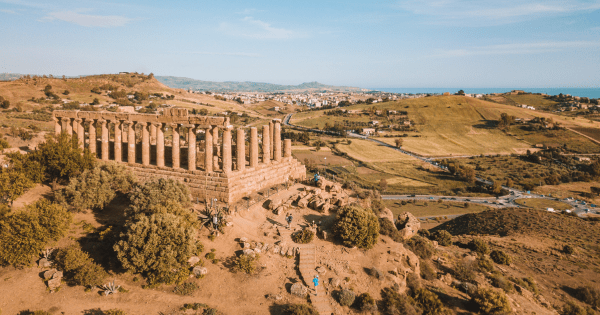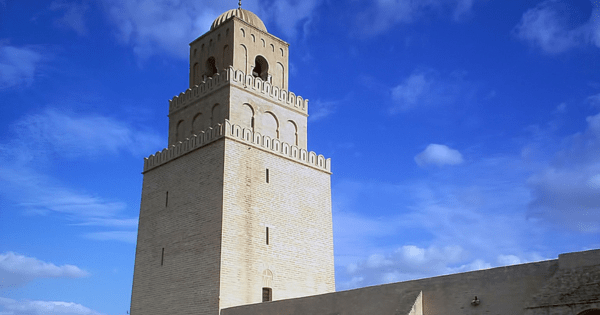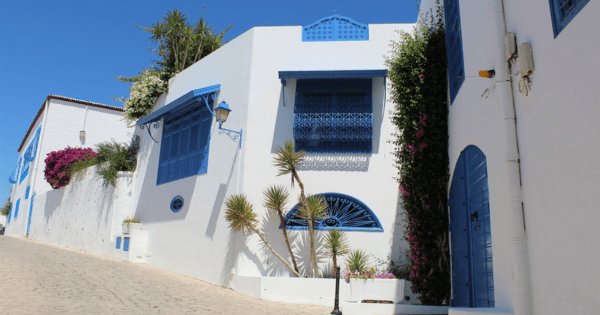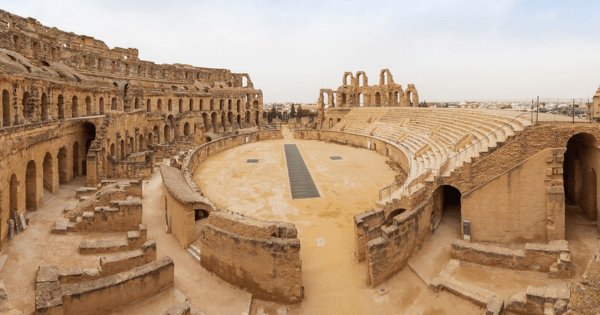Time in Tunisia: Tunisia, one of the best countries in North Africa, is a fascinating blend of ancient history, diverse landscapes and vibrant culture. It is part of the Maghreb region of North Africa. The country also includes the northern edge of the Sahara Desert and the eastern end of the Atlas Mountains. Its capital is Tunis. The official language is Standard Arabic. From the bustling Medina to the quiet desert, the country offers a wealth of experiences to every traveler. Currency (1 Tunisian Dinar = .32 USD on Date June 10, 2024) In this post, we will tell you about the best places to visit in Tunisia, which sums up why “Time in Tunisia” is worth a visit.

- Tunis: Capital: Medina of Tunis Start your trip in the heart of Tunisia’s capital, Tunis, which is a city port. It is a UNESCO World Heritage Site and a maze of bustling markets. Here, you can buy spices, clothing and traditional crafts. Visit the stunning Zaytouna Mosque, an 8th-century architectural marvel. Bardo National Museum For history enthusiasts, the Bardo National Museum is a must-visit. It houses the largest collection of Roman mosaics in the world, offering a glimpse into Tunisia’s rich historical tapestry.
- Carthage: Echoes of Antiquity A short drive from Tunis takes you to Carthage, 16.5 km away, an ancient city that was once the heart of the Carthaginian Empire. Visit the ruins of the Antonine Baths, Punic Ports and Carthage Museum to delve deeper into the country’s Phoenician and Roman past. Its history dates back 3000 years.
- Sidi Bou Said and Dougga: Located on a hill overlooking the Mediterranean Sea, Sidi Bou Said is a picturesque village known for its whitewashed buildings and blue accents. Named after a religious figure, Abu al-Baji, enjoy strolling its charming streets, visiting the Enezma Ezzahra Palace, and sipping coffee at the Café des Nattes. This UNESCO World Heritage Site is set among rolling hills and offers visitors a chance to see ancient temples, a theater, and grand public baths. Walking through Dougga is like stepping back in time, offering a unique glimpse into the daily life of the ancient Romans.

- Kairouan: The spiritual heart of Tunisia One of the holiest cities in Islam, Kairouan is a center of religious and historical significance. The Great Mosque of Kairouan, with its vast courtyard and tall minaret, is a masterpiece of Islamic architecture. The city’s medina is also famous for its traditional carpets and vibrant markets. If you want to know about Kairouan UNESCO world heritage then click on this
- Tozeur: The Gateway to the Sahara Tozeur is a desert oasis that serves as the gateway to the Sahara. There is the lush palm grove, the Dar Cheriat museum and the Star Wars set For movie lovers, Tozeur offers a unique charm that you will love visiting.
- Matmata: Underground Dwellings Matmata is famous for its troglodyte homes, which are carved into the earth to provide natural insulation from the harsh desert climate. These unique dwellings were also featured in Star Wars as Luke Skywalker’s home. Visit a local home to understand this ancient lifestyle and appreciate the ingenuity of its inhabitants.

- Hammamet: Beaches and beyond If you want to relax, Hammamet is the perfect coastal retreat. Known for its stunning beaches and luxury resorts, it is a perfect place for relaxation, water sports, or sunbathing on the sandy shores.
- El Jem: The Vast Amphitheatre El Jem is one of the largest Roman amphitheatres in the world. This grand structure, which is also a UNESCO World Heritage Site, could accommodate 35,000 spectators at a time. Walking through its well-preserved arches and tunnels, you can almost hear the echoes of ancient gladiators.
- Djerba: The Island of Fantasy An island off the southern coast, Djerba is a fusion of cultures and traditions. Visit the El Ghriba synagogue, one of the oldest Jewish temples in the world, and explore the island’s main town, Hummet Souk, which has lively markets and historic fortresses. Djerba’s sandy beaches and crystal-clear waters also make it a haven for sun-seekers. If you want to know about “Time in Belize” click here
Conclusion: Enjoy your time in Tunisia From ancient ruins to vibrant bazaars, quiet deserts to bustling cities, Tunisia is a country that offers a range of incredible experiences. Whether you are a history buff, beach lover or adventure enthusiast, “Time in Tunisia” will give you unforgettable memories and a deep appreciation of this fascinating destination. Plan your trip, pack your bags and set off on a journey through time in Tunisia. The wonders of the Maghreb await you. Thank you!

FAQs:-
- What is the best time to visit Tunisia?
The best time to visit Tunisia is during the spring (March to May) and autumn (September to November) when the weather is mild and pleasant. These seasons offer comfortable temperatures for exploring the cities, beaches, and desert regions.
- Do I need a visa to visit Tunisia?
Visa requirements for Tunisia vary depending on your nationality. Many visitors, including those from the EU, USA, and Canada, can enter Tunisia without a visa for stays up to 90 days. It’s always best to check with the Tunisian consulate or embassy in your country for the most up-to-date information.
- What is the official language in Tunisia?
The official language of Tunisia is Arabic. However, French is widely spoken and understood, especially in business, government, and tourism sectors. English is also commonly spoken in tourist areas.
- Is Tunisia a safe country to visit?
Tunisia is generally safe for tourists, with a welcoming and friendly local population. However, like any travel destination, it’s essential to stay aware of your surroundings, follow local advice, and avoid any areas that may be experiencing unrest.
- What currency is used in Tunisia?
The currency used in Tunisia is the Tunisian Dinar (TND). It’s advisable to carry some cash for smaller purchases, as not all places accept credit cards. ATMs are widely available in cities and towns.
- What are the must-see historical sites in Tunisia?
Tunisia is rich in historical sites. Must-see locations include the ruins of Carthage, the Medina of Tunis, the ancient city of Dougga, the amphitheater of El Jem, and the Great Mosque of Kairouan.
- Can I visit the Star Wars filming locations in Tunisia?
Yes, Tunisia has several Star Wars filming locations, particularly around Tozeur and Matmata. You can visit the Mos Espa set and the troglodyte homes that served as Luke Skywalker’s home.
- What type of clothing should I pack for Tunisia?
Pack light, breathable clothing for the hot summer months, and layers for cooler evenings, especially in the desert. When visiting religious sites or rural areas, it’s respectful to wear modest clothing that covers your shoulders and knees.
- How can I get around in Tunisia?
Tunisia has a good network of public transportation, including buses, trains, and shared taxis (louages). Car rentals are also available, and guided tours are a popular option for exploring the country’s diverse attractions.
- What should I know about Tunisian cuisine?
Tunisian cuisine is a delightful mix of Mediterranean and Arabic influences. Must-try dishes include couscous, brik (a type of pastry), and tagine. Seafood is also abundant along the coast. Don’t miss the chance to sample traditional sweets like makroudh.
- Is bargaining common in Tunisia?
Yes, bargaining is a common practice in Tunisia, especially in markets and souks. It’s part of the shopping experience, so feel free to negotiate prices for souvenirs, clothing, and other goods.
- Are there any cultural etiquette tips for visitors to Tunisia?
Respect local customs and dress modestly, particularly in rural areas and religious sites. Always ask for permission before taking photos of people. It’s polite to greet people with a handshake or a friendly “Salam alaykum” (peace be upon you).
- Can I use my mobile phone in Tunisia?
Yes, most international mobile phones work in Tunisia. However, roaming charges can be high, so consider buying a local SIM card for cheaper calls and data. Wi-Fi is widely available in hotels, cafes, and restaurants.
- What are some unique experiences to have in Tunisia?
Unique experiences in Tunisia include exploring the Sahara Desert, staying in a traditional troglodyte dwelling in Matmata, enjoying a hammam (traditional bath), and attending a local festival or market.
- How should I handle tipping in Tunisia?
Tipping is appreciated in Tunisia but not mandatory. In restaurants, a tip of 5-10% is customary if service isn’t included. It’s also polite to tip hotel staff, guides, and taxi drivers for good service.
